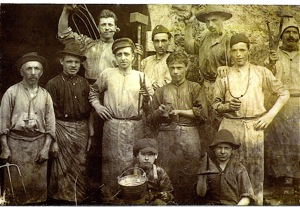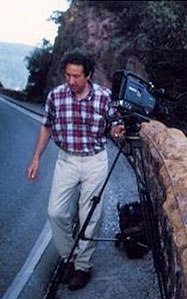
THE TIME OF THE HAMMER
Year: 1996
Lenght: 23 min
Copyright: Alberto Cima
Direction, screenplay, cinematography and editing: Alberto Cima.
Assistant director: Paola Ratti.
Screenplay: Elvira Cassetti Pasini, Alberto Cima, Paola Ratti
Original Music: Walter Frazzi
From an idea of Elvira Cassetti Pasini and Ruggero Brunori
Cast:
Beppe Pasini, Giuseppina Cominotti, Bortolo Brunori, Renato Zola, Bianca Guerra, Daniela Leali, Alessio Pasini, Matteo Tononi.
Financed:
Acciaierie e Ferriere Bredina, Acciaierie e Ferriere Ilfo, Acciaierie e Ferriere Iro, Acciaierie e Ferriere Leali Luigi, Feralpi Siderurgica, Ferriera Valsabbia, Olifer, Dario Leali, Alessio Pasini
with the patronage of Civiltà Bresciana
History of ironworking at Odolo
Review:
Alberto Pesce
But it is with Il tempo del maglio, (The Time of the Hammer), (1996) that Cima goes back to dealing with mankind and nature… The twenty-three minute long video balances in the two times the Odolo people’s united, laborious humanity, home and breeding ground for survival instincts but also for love of work and things. (Odolo is a village in the Sabbia Valley area, in the province of Brescia).
At first as if closely knitting men and nature, amongst the former skinny, discreet and reluctant figures with needs of limited horizons and the latter represented by water springs of the Vrenda brook along cliffs and gorges, Il tempo del maglio lines up documents of the time, witnesses of today, scraps of rustic folklore, to outline an ancestral fate of poverty and mountain resoluteness, where everything moves ritually in a reciprocal and generous solidarity in order to oppose fear and misery… Then, with a sudden rhythmical leap, as if leaving behind cameo-portraits of the old school and faraway memories which stir up domestic approaches, vernacular pet phrases, but also trading beyond the hill of Sant’Eusebio maybe climbing with mules, grappling towards the Venetian, Tuscan, Romagna, Neapolitan markets, there takes over the Odolese technology of the rolling mill… The imagery of the film opens up: not only does it eulogize a world of old mountain stocks rooted to the land and inexhaustible in work. It is a sort of canticle in crescendo in honour of a defying intelligence which, answering to a new market, knows how to stick together in order to face new risky but demanding manufacturing realities.
Review:
Alberto Pesce
But it is with Il tempo del maglio, (The Time of the Hammer), (1996) that Cima goes back to dealing with mankind and nature… The twenty-three minute long video balances in the two times the Odolo people’s united, laborious humanity, home and breeding ground for survival instincts but also for love of work and things. (Odolo is a village in the Sabbia Valley area, in the province of Brescia).
At first as if closely knitting men and nature, amongst the former skinny, discreet and reluctant figures with needs of limited horizons and the latter represented by water springs of the Vrenda brook along cliffs and gorges, Il tempo del maglio lines up documents of the time, witnesses of today, scraps of rustic folklore, to outline an ancestral fate of poverty and mountain resoluteness, where everything moves ritually in a reciprocal and generous solidarity in order to oppose fear and misery… Then, with a sudden rhythmical leap, as if leaving behind cameo-portraits of the old school and faraway memories which stir up domestic approaches, vernacular pet phrases, but also trading beyond the hill of Sant’Eusebio maybe climbing with mules, grappling towards the Venetian, Tuscan, Romagna, Neapolitan markets, there takes over the Odolese technology of the rolling mill… The imagery of the film opens up: not only does it eulogize a world of old mountain stocks rooted to the land and inexhaustible in work. It is a sort of canticle in crescendo in honour of a defying intelligence which, answering to a new market, knows how to stick together in order to face new risky but demanding manufacturing realities.

